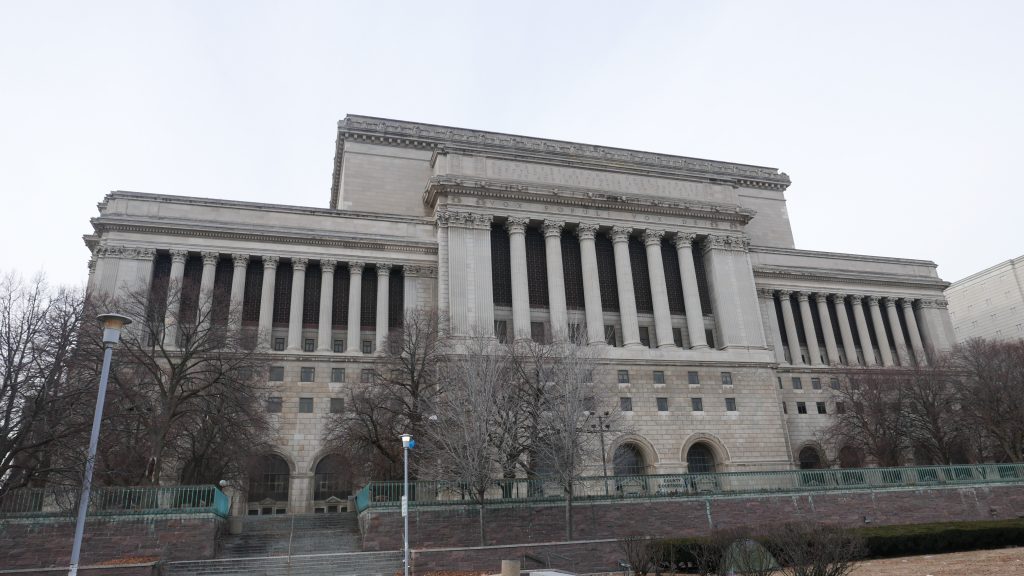Can Milwaukee Circuit Court Clear Backlog By 2024?
Chief judge expresses doubt, but progress is being made and hope remains.
The criminal justice system in Milwaukee is still trying to recover from the COVID-19 pandemic, although some officials say the problems go back much further.
Chief Milwaukee County Circuit Court Judge Mary E. Triggiano said Thursday that the courts face a backlog of 1,570 felony cases versus where it was in 2019.
While not having oversight of the courts, the council held a special hearing on the matter after Milwaukee Public Department representatives said a 10,000-case backlog was negatively impacting public safety during the fall 2022 city budget debate.
Triggiano said the backlog wasn’t that large, nor is it an even larger figure used by another agency. She said the courts only look at the backlog in terms of cases that can move to trial. “The backlog is not 24,000 cases. In our criminal division the backlog is around 1,600 cases and that’s down because we have been working very diligently and hard,” said the chief judge. The misdemeanor court has a backlog of only 31 cases she said and has recovered due to a variety of strategies. The criminal traffic courts have a negative backlog when compared to 2019.
District Attorney John Chisholm said the pandemic didn’t cause the issues. “It really is a consequence of years and years of neglect of the public safety system that was just exacerbated by the public health crisis,” said Chisholm.
“We have lost the capacity to be proactive. We have lost the capacity to intervene proactively at key moments,” said the district attorney. ‘We need to get back into that space where we identify problems and stop them before they occur.” Chisholm said that issue was plaguing all levels of the system, including police and fire. “You hate to put it this way, but we’re just locked into picking up the bodies at this point.”
He said he was happy that his office was recently able to add a new community prosecutor to a southside police station.
Governor Tony Evers allocated $16 million from the state’s American Rescue Plan Act to address the backlog. Triggiano said it’s helped with hiring, but a number of entities are still losing people even as new individuals are trained.
“We have added staff through the ARPA funding to increase our ability to reach out to attorneys,” said Tom Reed, regional attorney manager for the State Public Defender.
Reed described a scenario where what used to be a written report is now 50 to 60 hours of footage an attorney must review. “We just have a small pool of lawyers to do this very serious work,” he said. “The complexity of cases rises when you have multiple people shooting at each other.”
Triggiano, flanked by an array of other senior judges, said strategic changes are being made to process more cases.
“We have added a fifth homicide/sexual assault court to address what is, unfortunately, a record level of homicides in our community,” said Judge David Feiss, the presiding judge in the felony division. He said a civil judge position was converted to a criminal position. “The civil filings are down somewhat significantly over the last several years.”
Feiss said an “expedited disposition” program has also been set up. It’s for situations where a defendant would like a quick ruling, but the judge overseeing the case cannot accommodate it on their schedule. A list of judges that could quickly take the case is maintained.
A new reserve judge now handles a full criminal court calendar. A second gun court was also established to deal with the surge in nonfatal shootings.
Feiss said the courthouse saw 220 felony trials last year. “That’s down slightly from what the average was before the pandemic, but we are working to get that number back.”
Alderman Mark Borkowski, referencing reports on jail capacity, asked corrections capacity influenced sentencing decisions.
“The problem is more the pretrial folks,” said Feiss, referencing Milwaukee County’s use of Racine County’s jail. “There is not an issue. If we sentence someone to jail or prison, they go… There are no restrictions, no limitations on judges in sentencing.”
Milwaukee County’s jail is used to house inmates awaiting trial, but the county’s Community Reintegration Center (formerly the House of Correction in Franklin) and state prisons are used after sentencing. Feiss said it was his understanding that, despite staffing issues, the Community Reintegration Center was only two-thirds full.
The misdemeanor division, which addresses less severe crimes, successfully resolved its backlog. The court implemented night court last year. “And that cleared out a really good number of cases,” said Presiding Judge Christopher Dee. The night court is currently shuttered, but Dee said discussions are underway to bring it back. “It does take some planning, but we are looking at some other creative ways to use the night court.”
“The bottom line I want you to know is we are working concertedly to address this,” said Deputy Chief Judge Carl Ashley.
What Can City Do?
Council members, including Milele A. Coggs, asked what the city could do to help.
“As the saying goes, an announce of prevention is worth a pound of cure,” said Ald. Scott Spiker.
Chisholm asked the council to consider investing any remaining ARPA dollars into helping young people, primarily teenagers. “Anything the city can do to supplement the work that is being focused and directed towards young people,” he said. He praised Ald. Michael Murphy for his interest in addressing the Kia-Hyundai car-theft epidemic and related juvenile crimes.
The district attorney said without intervention, minor things become major and individuals who have experienced trauma react poorly. “All of this is in the context where every community is now saturated with firearms,” said the district attorney of a national surge in gun purchases.
“We live in these communities as well. We want to make sure they are safe. We want to make sure we provide fairness in the courts and justice,” said Triggiano. The chief judge will leave the bench for a role at Marquette University later this year.
Legislation Link - Urban Milwaukee members see direct links to legislation mentioned in this article. Join today
If you think stories like this are important, become a member of Urban Milwaukee and help support real, independent journalism. Plus you get some cool added benefits.
Related Legislation: File 221170
Political Contributions Tracker
Displaying political contributions between people mentioned in this story. Learn more.






















